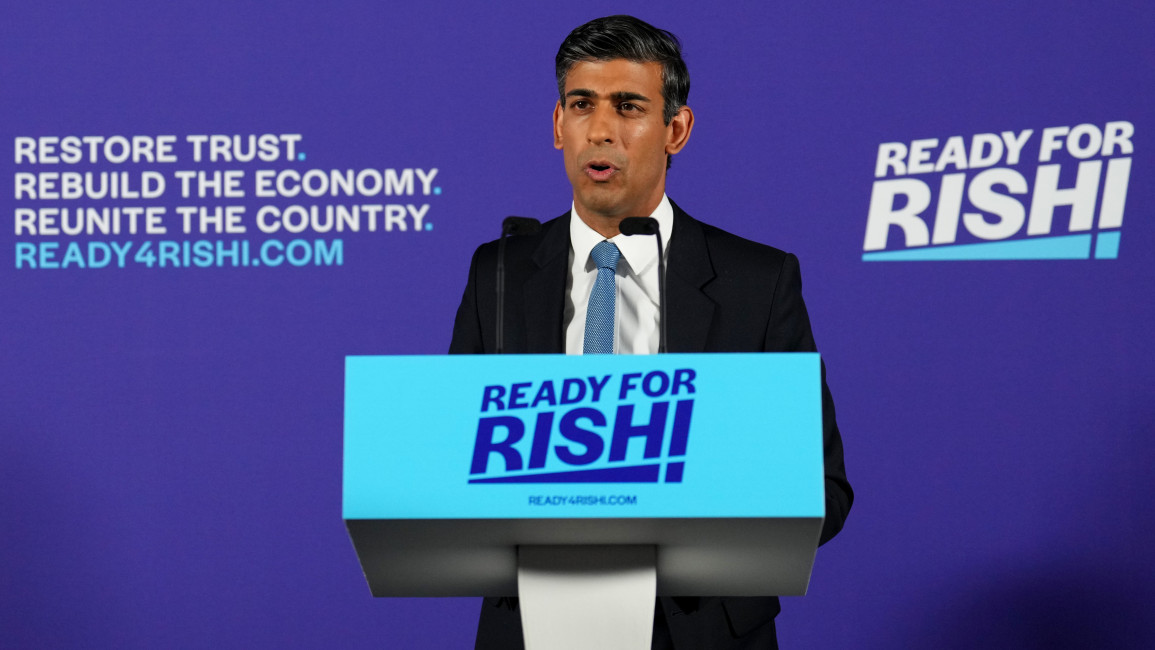
In Rishi Sunak's fight for PM, Palestinians are just collateral damage
In a Q&A session with members of the lobby group Conservative Friends of Israel two weeks ago, Tory leadership candidate and former Chancellor Rishi Sunak was asked whether he - as a potential next prime minister - will recognise Jerusalem as Israel’s capital.
Sitting straight with shoulders back and head held up, he quickly responded that Jerusalem is "indisputably" Israel's "historic capital,” and that there is a “very strong case” for the UK to move the British Embassy from Tel Aviv to Jerusalem.
“Indisputably,” “historic,” and “very strong case” are all utterances that ooze fluency and confidence. They are made to impress and resonate with the audience but in actuality do not deliver once put to the test of history and geopolitics.
Sunak condensed in a short statement all the elements of “disputability,” which he negligently and without scrutiny brushed off as “indisputable,” in the Israeli-Palestinian situation. Yet apparently, because confidence trumps knowledge and privilege transcends the average man’s reality, we were supposed to take his words as gospel and move on with our lives.
"The Ottoman system, which was also upheld by the British mandate in Palestine, provided no power hierarchy that would prioritise one religious group’s needs over the others"
For Israelis, it is obviously and dubiously a eureka moment after a series of Hail Marys in the five years after President Trump had recognised Jerusalem, West and East, as Israel’s capital. Tel Aviv has since set out on a semi-fruitless mission to convince other countries to follow suit, ultimately altering Jerusalem’s status quo.
East Jerusalem, which the international community recognises as an Israel-occupied Palestinian territory since 1967, has been under a status quo since the Ottoman era. The Ottoman system, which was also upheld by the British mandate in Palestine, provided no power hierarchy that would prioritise one religious group’s needs over the others, a reality that the Israeli occupation has been aggressively attempting to upset through Judaisation and forceful dispossession of Palestinian Jerusalemites.
Palestinian Muslims and Christians think of Jerusalem as their historic capital, originally built by the ancient Canaanites in 2500 B.C., and it is revered as Christ’s resting place and Islam’s third holiest site.
Jews believe that in 1000 B.C. King David conquered the city and made it his capital. The thousand-year-old site of al-Aqsa Mosque compound, they say, is the site of the destroyed First and Second Temples (586 B.C. and 70 C.E. respectively).
As the candidates in the Tory leadership race both commit to strengthening ties with Israel and supporting attacks on BDS to the detriment of Palestinians, students across the UK are already defying this growing repression, writes @PscYouth’s Stella Swain. https://t.co/StSIJHuBoQ
— The New Arab (@The_NewArab) August 28, 2022
Adding to the fact that independent scientific verification for the Jewish claims is scarce and no significant archaeological remains have been found to support them, Palestinians see the Israeli claims as nothing but Biblical mythologies revived and politicised to serve the Zionist settler-colonial project.
What is verified, however, is that without East Jerusalem, a Palestinian state will never be realised. The tension and violence in the region, as a result, will continue and - as the Palestinian hope for self-determination is shut down - the situation will likely spiral out of control.
To this extent, Rishi Sunak trivialised the issue.
But to give him some credit, the former Chancellor was realistic enough to leave some wiggling space for interpretation. As a good politician would, Sunak future-proofed the possibility of failure to follow through on his promises should he become the next prime minister.
He warned the audience that he had never been Foreign Secretary and therefore was not aware of the "sensitivities" of the issue. Nevertheless, he reiterated that the case was "very strong” without delivering any argument to back his claim.
The trivialisation is damning not merely because it is indicative of Sunak’s ignorance on the matter, but because it points to a trend in British official institutions - the Conservative Party in particular - that establishes a hierarchy of victimhood based on interests, ethnicity, and religion. In that hierarchy, Palestinians, regardless of the authenticity of their victimhood, reside at the bottom.
By promising to recognise Jerusalem as Israel’s capital, Sunak effectively shows zero consideration for Palestinian rights, irresponsibly and apathetically tramples upon their historical grievances and demands for justice. The fact that Britain was the driving force behind Israel’s establishment and the subsequent Palestinian dispossession adds a disturbingly immoral irony to his sentiment.
"By promising to recognise Jerusalem as Israel’s capital, Sunak effectively shows zero consideration for Palestinian rights, irresponsibly and apathetically tramples upon their historical grievances and demands for justice"
The Conservative Middle East Council (CMEC), an organisation that helps Tory MPs and peers better understand the Middle East, warned of the unsettling consequences of supporting or ignoring Israel’s annexation plans of Palestinian land and the failure to establish an independent Palestinian state with East Jerusalem as its capital. It is not only about trapping the Palestinians and Israelis in an open-ended occupation, said CMEC, but also about the fate of the international order itself.
Theoretically, Number 10 remains committed to the two-state solution, including the rejection of any unilateral Israeli steps that violate international law. The UK took a hard position on Russia’s annexation of Crimea in 2014 and today is at the forefront against Russia’s invasion of Ukraine, as well as China’s potential annexation of Taiwan.
Boris Johnson has made it a habit of reminding us of the enormity of any changes in the world order, emphasising - almost every time - the UK’s firm position on upholding international law and calling out behaviours contrary to its principles.
But words are hardly taxable, certainly meaningless when international law is interpreted and implemented selectively, not based on the rule of law or moral principles, but realpolitik and interests.
The political and economic interests between London and Tel Aviv far outweigh any material or non-material benefits Palestinians can ever provide the UK, putting them at a serious disadvantage in British foreign policy.
Behind the UK’s lip service to the two-state solution, the Johnson government has been on a path to cripple any meaningful Palestine rights campaigning. This includes the government’s attempts to pass legislation that incriminates BDS and labels Palestinian solidarity activism as anti-Semitic.
The measures aim to incapacitate any grassroots movements that may counterbalance the UK government’s selective commitment to international law in Palestine. Within such a reality, turning a blind eye to Israel’s violations, even condemning Palestinian right to self-defence as Liz Truss did during the August onslaught on Gaza, becomes acceptable.
"The political and economic interests between London and Tel Aviv far outweigh any material or non-material benefits Palestinians can ever provide the UK, putting them at a serious disadvantage in British foreign policy"
Realpolitik, however, does not function in a vacuum. It is also driven and legitimised by ethnic, historical, and religious factors, which in the UK case, have laid the ground for a “shared values” system between Israel and Britain.
Palestinians within this system are categorised as “the other,” sometimes framed in Orientalist, Islamophobic terms, which makes it acceptable to downgrade their humanity and present their human rights as less valuable than Israel’s security requirements.
For Rishi Sunak, much like the hordes of Islamophobes and profit-driven officials in the Tory government, commitment to Israel is a matter of ideological identification, political and economic interests, and - especially for minority politicians - a route for peer validation and career advancement.
Against such criteria, Palestinians cannot compete.
Dr Emad Moussa is a researcher and writer who specialises in the politics and political psychology of Palestine/Israel.
Follow him on Twitter: @emadmoussa
Have questions or comments? Email us at: editorial-english@alaraby.co.uk
Opinions expressed in this article remain those of the author and do not necessarily represent those of The New Arab, its editorial board or staff.




